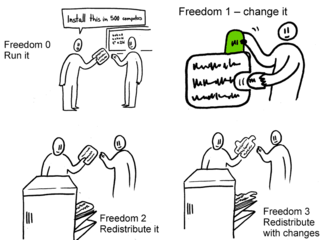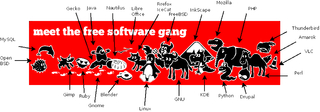What is Free Software?
Published on
Free software refers to software that respects users' freedom and community. It means that the users have the freedom to run, copy, distribute, study, change and improve the software. Thus, "free software" is a matter of liberty, not price. Here, "free" is used as in "free speech," not as in "free beer". A program is free software if the program's users have1 four essential freedoms:

Figure 1: The four freedoms of free software
Freedom 0 - Freedom to run the program as the user wishes, for any purpose
Freedom 1 - Freedom to study how the program works, and change it so it does the user's computing as the user wishes. Access to the source code is a pre-condition for this.
Freedom 2 - Freedom to redistribute copies so users can help their neighbors.
Freedom 3 - Freedom to distribute copies of the user's modified versions to others. By doing this we can give the whole community a chance to benefit from our changes. Access to the source code is a precondition for this.
Why not proprietary software?
Proprietary software tends to have malicious features that give the developer unjust power over its users2. For example, Microsoft Windows has a universal backdoor through which it is possible3 to remotely enforce any change in user's computer. In Windows 10, this backdoor is no longer hidden, and all updates have been made4 mandatory and forced.
Proprietary software also enables censorship and the creation of jailed devices. For example, the tech corporate giant Apple censored5 an app that reports on US drone assassinations. Whether or not the political causes that Apple supports are justified or not, such proprietary software puts these companies in a position of unjust power over a helpless user and should not exist.
Digital handcuffs in proprietary devices and software – such as Digital Rights Management (DRM) locks over e-books – enforce arbitrary restrictions on sharing as well as the use, of audio, video and other media in the name of copyright protection.

This practice has even entered the world of physical devices. For instance, the automobile giant Renault introduced6 a modification in the design of their batteries which allows them to remotely prevent the battery from charging. Such power over users' devices is unacceptable, and has potential for misuse by unethical corporations and authoritarian governments.
Other than such intentionally introduced bugs and / or backdoor channels, many proprietary software have been found to contain unintentional bugs and insecurities in their code that have possible grave consequences. For example, vulnerabilities have been found7 in hospital drug pumps that can be misused by hackers to administer fatal doses to patients.
Even though all non-trivial software have bugs, the developers of proprietary software often deny their existence or even brush them aside in the fear that it would tarnish the reputation of their firm. Even if users of these software come to notice the bugs, they are helpless in fixing them. On the other hand, any bugs in free software can be fixed quickly because the entire source code is made available for anyone to scrutinize, report and / or fix the bugs themselves.
How to make money with free software?
There are a lot of different ways to make money from free software. Many companies use the available free software, build on it to develop an advanced or modified custom software and sell it at a price. For these companies, free software libraries and programs are valuable resources from which to build on, without having to pay for restrictive proprietary licenses. On the other hand, companies like RedHat make free software, but IT services for those software are provided for a price.
Many free software projects such as VLC, Debian GNU / Linux are community run non - profits and depend on donations. Some non-profits such as the Free Software Foundation also get a part of their revenue selling hard copies of software manuals, books, and other promotional gear. Projects such as WordPress support themselves by providing hosting services for their software for a price.
Start-ups & free software
Free software is extremely useful for budding start-ups, even to those that make proprietary software. Even web giants such as Google and Facebook heavily utilize the available free software to build their services. In fact, these giants could never have existed in the first place without free software. While it is good that such web service providers have their freedom, it is much more important that all computer users have their freedom too, and the latter is a state worth promoting and working towards.
Is competition always better?
The paradigm8 of competition is analogous to a race: by rewarding the winner, we encourage everyone to run faster. When capitalism really works this way, it does a good job; but its defenders are wrong in assuming that it always works this way.
If the runners forget why the reward is offered and become intent on winning, no matter how, they may use other strategies to win - such as, attacking other runners. If the runners get into a fist fight, they will all finish late. Proprietary software is the moral equivalent of runners in a fist fight. The only referee to we have, to settle such fights, is the government which does not seem to object to fights and just regulates them - "For every ten yards you run, you can fire one shot". Ideally, the government ought to break up the fights, and penalize runners for trying to fight.
Free software or open source software?
Free software is often popularly called open source software. "Open source" is a de-politicized term that takes the focus away from larger political and ethical issues of software freedom. Supporters of "open source" generally focus only on the improved quality of software developed through public collaboration and ignore the issues of freedom concerning software. This results in a loss of our freedoms. Hence it is essential to use the term "free software", and not "open source".
Is free software communist?
Even though the free software movement is filled with individuals with different political inclinations - capitalist, communist, anarchist, etc., its philosophical underpinnings are by no means limited to or applicable only to any one of those ideologies.
In today's oligopolistic and monopolistic capitalism, it is easy to forget that a healthy capitalism needs perfect competition where individuals are free to enter the market with their own products. But, Proprietary software prevents healty market competition by establishing monopolies. On the contrary, free software allows any small software company in a little town to quickly develop their own products without having to start from scratch. Thus free software actually empowers individuals and creates a healthy market.
Image Credits
The four freedoms of free software -- by Christian Noguera, Valentin Pasquier, Richard Stallman, released under the Creative Commons Attribution 3.0 Unported license